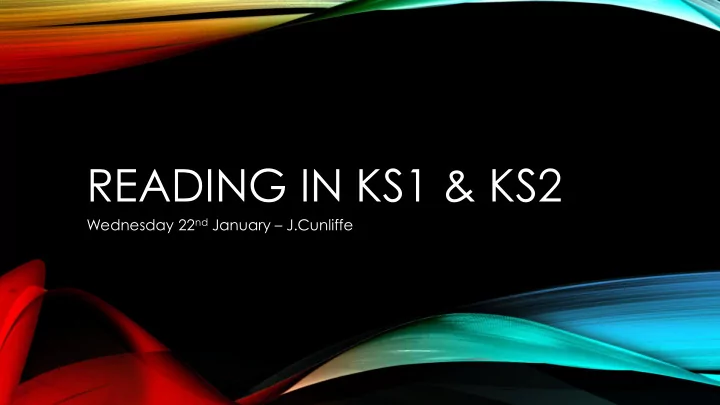

READING IN KS1 & KS2 Wednesday 22 nd January – J.Cunliffe
AIMS • To show how reading skills are developed through a guided reading approach in KS1 and KS2 • To learn more about the assessment of reading in primary school. • To give practical suggestions to help you to support and develop your child’s reading.
‘The most important skill any child can leave primary school with is the ability to read independently and effectively for meaning ’
THINK BACK TO YOUR EARLY READING EXPERIENCES. • Do you remember who taught you to read? • Were you encouraged to read for pleasure? • Was reading an enjoyable experience for you? • Did you have a favourite author / book? • Were you brought up in a rich reading culture? • Did you develop a life-long love of reading that is still with you today?
WHAT ABOUT NOW? • Do you read for pleasure and enjoyment? • Do your children see you reading? (role model) • Do you encourage your children to read for pleasure and do you talk to your children about the books they are reading? • Are your children on the right path to becoming readers for life?
A SURVEY – PROGRESS IN INTERNATIONAL READING LITERACY STUDY (PIRLS) FOUND: • Children in England tended to report reading for pleasure less frequently than peers in many other countries. • 23 rd out of 29 countries in terms of pupils attitudes to reading. • 1/3 of children reported reading for pleasure on a daily basis outside school. • 42% said they read for pleasure outside school every 2 months or less. • By the time they reach secondary school, 40% of students in the UK report that they do not read for enjoyment.
WHY IS READING SO IMPORTANT? • The ability to read fluently and with meaning develops and enhances many skills including: • Vocabulary/spelling attention span • Grammar sense of well-being • Pronunciation etc. • Understanding and interpreting • Memory • Communication • Imagination • Knowledge of the world
THE TEACHING OF READING • There are two aspects of reading that we teach and which are inextricably linked; • The ability to decode print – (to read the word on the page) • The ability to understand and make meaning from the printed word Generally it is this second aspect of reading that we focus on in greater depth as the children move up the school.
WHAT IS GUIDED READING? • Takes place daily for 20 minutes • Groups work with the teacher once during the week. • Other groups engaged in independent, reading related activities. (preparation and follow-up tasks, independent reading, comprehension activities, creative journals etc …) • Groups of children of similar reading ability work together on the same text. • The teacher guides the children to focus on and apply key strategies while reading independently. • The teacher gives focused attention to support, monitor and assess individuals as they read. • The teacher asks questions, promotes discussion and interacts with the children to extend their thinking and develop their responses to the text.
WHAT IS GUIDED READING? • Children contribute to discussion, talking through their responses to the text. They listen to each other (under the guidance of the teacher) • Children learn from each other and take increasing responsibility for their reading as they become more mature • The teacher monitors and records children’s progress to inform future teaching, targets and assessment • It is not a group reading session where children take turns to read aloud within the group. • Reading for purpose and pleasure is key!
WHAT MIGHT THAT LOOK LIKE?
THE ASSESSMENT OF READING • AF1 Use a range of strategies including accurate decoding of text, to read for meaning (until NC Level 3, then not assessed) • AF2 Understand, describe, select or retrieve information, events or ideas from texts and use quotation and reference to text • AF3 Deduce, infer or interpret information, events or ideas from texts • AF4 Identify and comment on the structure and organisation of texts, including grammatical and presentational features at text level • AF5 Explain and comment on writers' uses of language, including grammatical and literary features at word and sentence level • AF6 Identify and comment on writers' purposes and viewpoints and the overall effect of the text on the reader • AF7 Relate texts to their social, cultural and historical contexts and literary traditions
HOW DO WE ASSESS READING? • Individual assessment made during guided reading and phonics sessions • Benchmark testing carried out half termly • Ongoing assessment during literacy lessons and other curriculum subjects • Children have individual reading targets, which they are assessed against • End of key stage assessments (Yr 2 and Yr 6) • Formal reading comprehension tests in Yrs 3,4 and 5 termly
WHAT CAN WE DO TO HELP IF PUPILS NEED EXTRA SUPPORT • Identified pupils may need support to develop their reading skills, in this case we have two programmes available to use. • BRP (x 3 15mins per week 1:1 sessions) • 1:1 readingjc • Rapid Reading (x3 25 mins per week 1:6 group) • Reading Buddies (1:1 reading with Y6 child)
WHAT CAN YOU DO TO SUPPORT YOUR CHILD? • Choose a quiet time • Make it an enjoyable experience enjoyable • Maintain the flow • Be positive • Success is key – (books sent home should be consolidation texts i.e 95% accuracy) • Visit the library • Little and often is best • Talk about the books they’re reading, using AFs questions • Read to your child (you’re never too old to be read to!)
BUG CLUB • All pupils have access to Bug Club interactive reading programme at home (school code: JJMW followed by Bug Club username and password) Let’s have a play! Prefects over to you!
ANY QUESTIONS? Thank you for coming out this evening! Thanks to our wonderful prefects too!
Recommend
More recommend